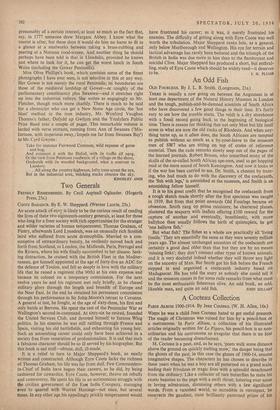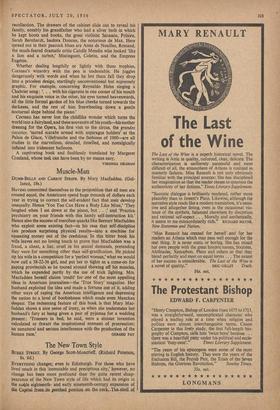A Cocteau Collection
PARIS ALBUM 1900-1914. By Jean Cocteau. (W. H. Allen, 16s.) WHEN he was a child Jean Cocteau hated to get useful presents. The magic of Christmas was ruined for him by a pencil-box or a metronome. ' In Paris Album, a collection of his illustrated articles originally written for Le Figaro, his pencil-box is so non- utilitarian and his metronome so irregular that there is no fear of the reader becoming disenchanted.
M. Cocteau is a poet, and, as he says, 'poets walk some distance above the ground on quickly melting snow,' the danger being that the ghosts of the past, in this case the ghosts of 1900-14, assume imaginative shapes. The characters he has chosen to describe in these years when he was a boy are all patterned on a grand scale, leading their frivolous or tragic lives with a splendid detachment from the ordinary. Like a collector of rare butterflies he stabs his exotic beauties to the page with a swift thrust, loitering over some in loving admiration, dismissing others with a few significant words. From a vanished world, so incredible in retrospect, he resurrects the gaudiest, most brilliantly patterned prizes of his recollection. The drawers of the cabinet slide out to reveal his family, notably his grandfather who had a silver bath in which he kept boots and books, the great violinist Sarasate, Polaire, Sarah Bernhardt, Isadora Duncan, the notorious dc Max. Here spread out in their peacock blues are Anna de Noailles, Rostand, the much-feared dramatic critic Catulle Mendes who looked 'like a lion and a turbot,' Mistinguett, Colette, and the Empress Eugenie.
Whether dealing lengthily or lightly with these trophies, Cocteau's wizardry with the pen is undeniable. He juggles dangerously with words and when he lets them fall they drop into a priceless design, startlingly unconventional but supremely graphic. For example, concerning Reynaldo Hahn singing a Chabrier song : . . with his cigarette in one corner of his mouth and his exquisite voice in the other, his eyes turned heavenwards, all the little formal garden of his blue cheeks turned towards the darkness, and the rest of him freewheeling down a gentle nocturnal slope behind the piano.'
Cocteau has never lost the childlike wonder which turns the world into a fairyland, and these souvenirs of his youth—his mother dressing for the Opera, his first visit to the circus, the grandes cocottes. 'sacred scarabs armed with asparagus holders' at the Palais de Glace, Villefranche and the fashions of 1900—are all studies in the marvellous, detailed, tinselled, and nostalgically inflated into iridescent balloons.
VIRGINIA GRAHAM



















































 Previous page
Previous page